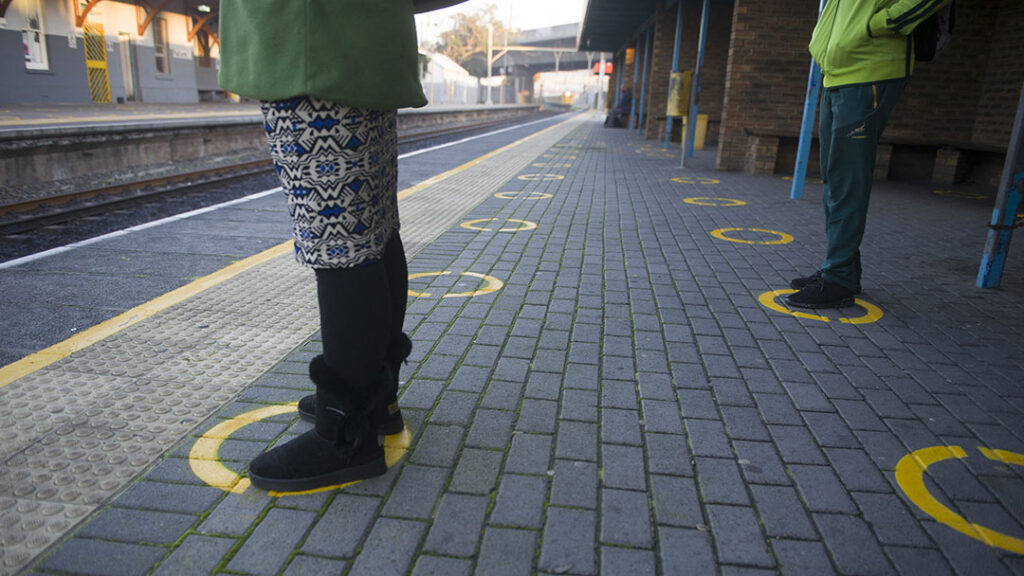ADF STAFF
Ten months in, new research is showing how the COVID-19 pandemic is spreading and how it can be stopped.
Researchers believe one key to fighting the pandemic in Africa will be limiting movement in the continent’s largest cities.
Scientists at Oxford University in the United Kingdom published “Crowding and the Shape of COVID-19 Epidemics” in the journal Nature Medicine. They found that the more people moved among different neighborhoods and mixed with different individuals, the longer it took for a COVID-19 outbreak to peak. In sparsely populated areas or isolated neighborhoods, the outbreak peaked quickly and then dissipated.
The study ranked the 310 largest cities around the world, including 61 in Africa. With a few exceptions, the forecast for Africa’s biggest cities was for long-term spread, particularly as leaders lift lockdowns and allow residents to mingle across neighborhoods instead of remaining in insulated communities. Among those facing a long haul is Lagos, Nigeria, where mask wearing and social distancing are fading as the pandemic wears on.
“Public health measures are often focused on ‘flattening the curve,’ but this research shows that what that curve looks like will be very different from city to city, town to town or even neighborhood to neighborhood,” said Dr. Moritz Kraemer, associate of the Oxford Martin Program on Pandemic Genomics. “Measures should be developed with that perspective in mind, for example, thinking about how an intervention reduces the circle of contacts of an average individual in each location.”
Spread Without Symptoms
Another Oxford University study found that as many as 40% of people who develop COVID-19 can spread the virus to other people before developing symptoms.
The study, which awaits peer review, shows the importance of social distancing, mass testing and contact tracing when it comes to interrupting the spread of the virus, the authors said. Their research suggests that contact tracing needs to go farther back in time — as much as two or three days before the person developed symptoms. Technology can help, they said.
“Digital contact tracing via a smartphone app, which makes the exposure notification step of contact tracing instantaneous, could substantially enhance the effectiveness of traditional manual contact tracing,” the study’s authors wrote.
It’s less clear, the study said, how likely asymptomatic people are to spread the virus. Asymptomatic people have been exposed to the virus but never develop symptoms. Studies in Mozambique have found high numbers of asymptomatic COVID-19 spread in certain communities.
The Africa Centres for Disease Control and Prevention has launched a continentwide study to assess how many people carry COVID-19 antibodies without showing symptoms and, therefore, may be potential spreaders.
Rinse the Virus Away
It’s well-established that the virus spreads through airborne droplets released when people speak, cough or sneeze. The greater the exhalation, the higher the potential dose of virus someone emits.
Masks protect people by catching those droplets and the hitchhiking virus particles before they can enter someone else’s nose or mouth.
Researchers have found another way to inhibit the spread of virus particles: mouthwash. Laboratory studies show that certain antiseptic mouthwashes containing hydrogen peroxide, ethanol and other compounds can virtually eliminate active virus particles after brief contact.
Along with mouthwashes, researchers tested a 1% solution of baby shampoo, which head and neck surgeons commonly used to rinse sinuses before surgery. In most cases, the mouthwashes and diluted baby shampoo killed 99.9% of virus particles after 30 seconds or more of contact.
“While we wait for a vaccine to be developed, methods to reduce transmission are needed,” said Craig Meyers, distinguished professor of microbiology and immunology at Penn State College of Medicine in the United States. “The products we tested are readily available and often already part of people’s daily routines.”
Researchers warned mouthwash is a patch, not a cure. It could protect people in situations where masks and social distancing aren’t practical, such as visiting the dentist. It’s not clear how long the effect lasts, Meyers said.
Researchers in Germany working on a similar study said more work is needed to see how the treatment works on people with active COVID-19 infections. They’ve begun recruiting patients for such a study.

